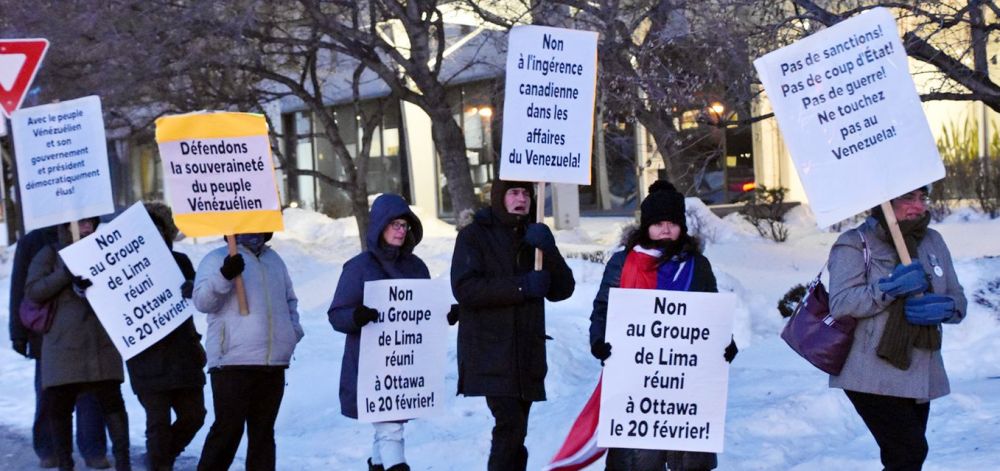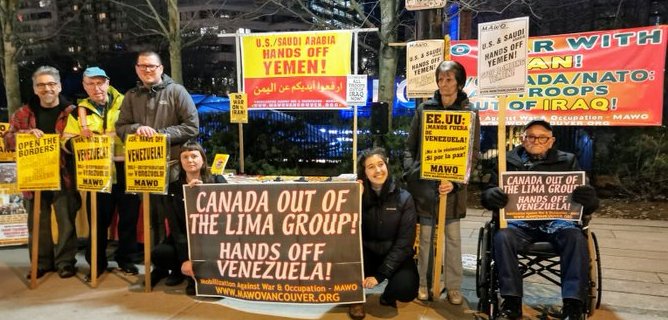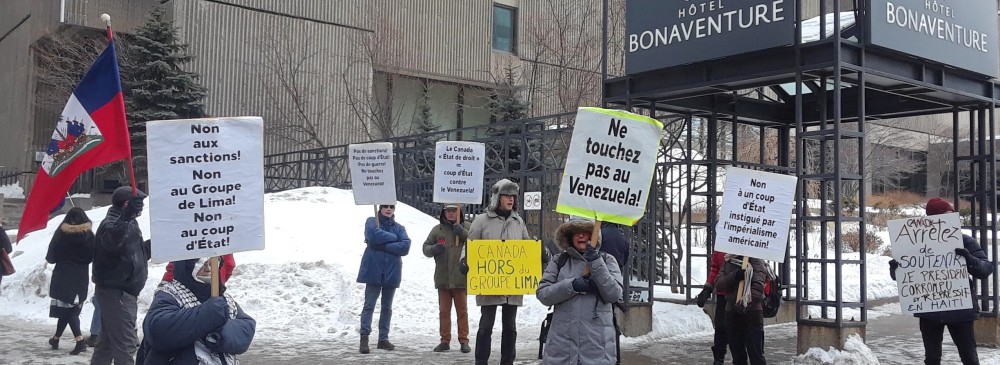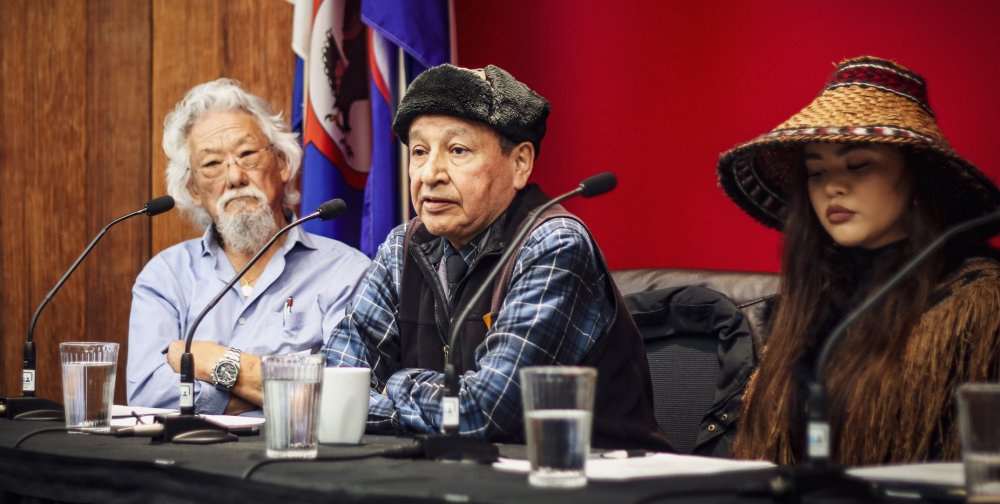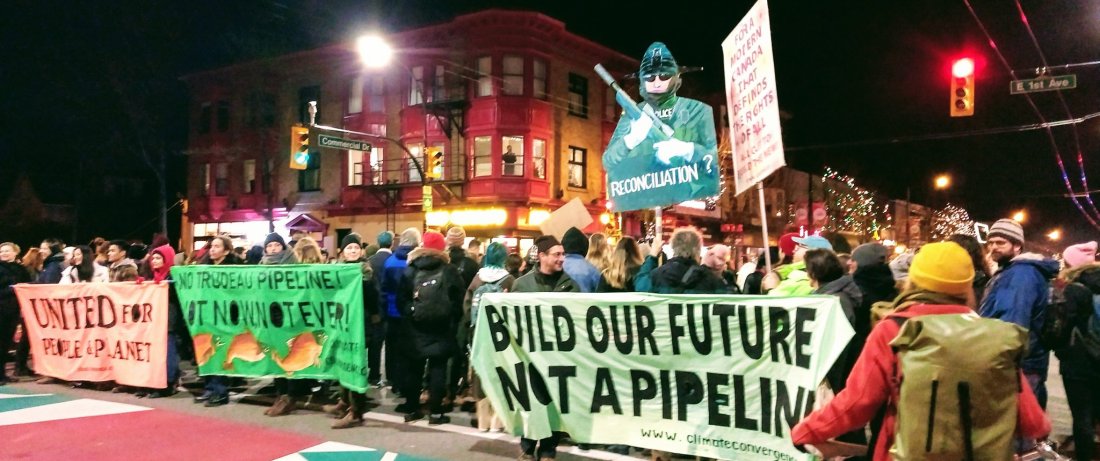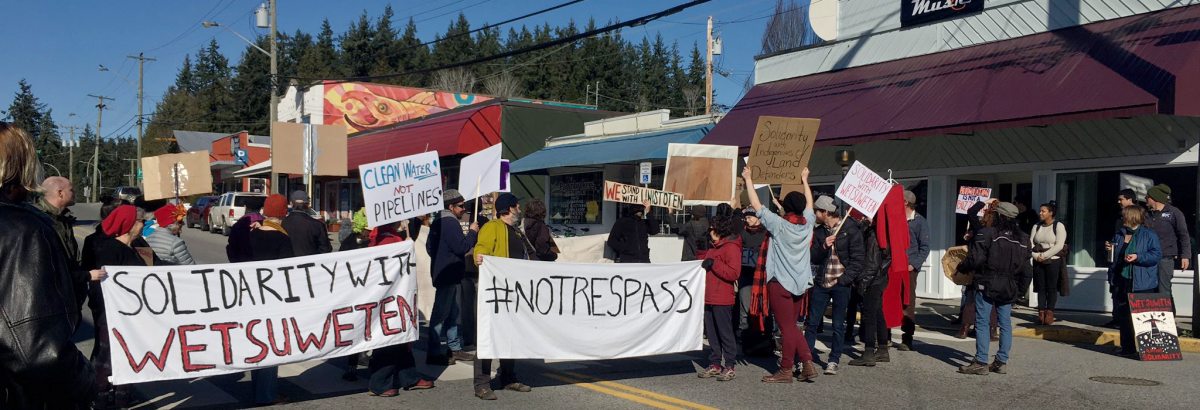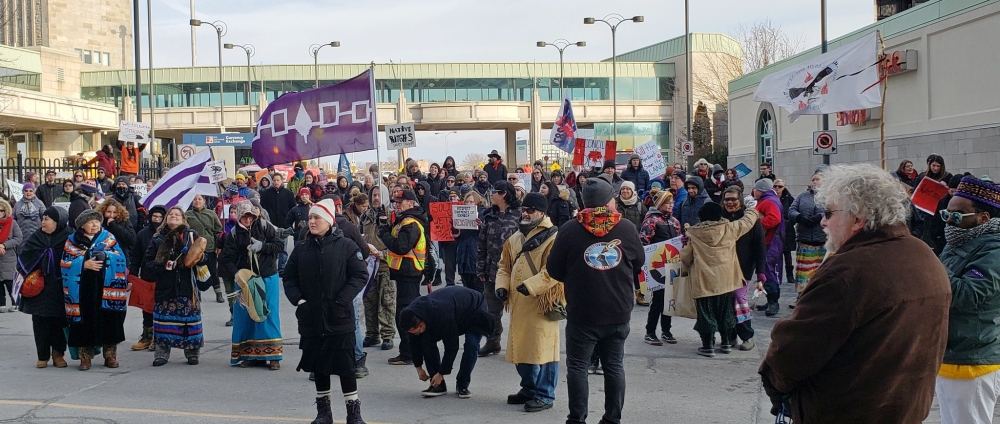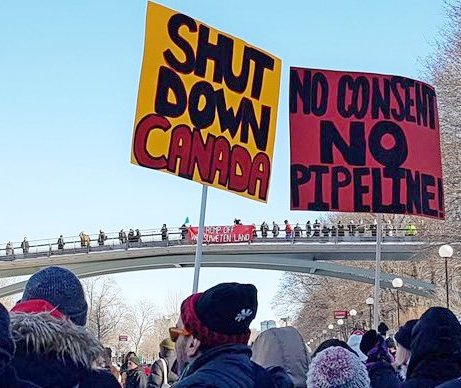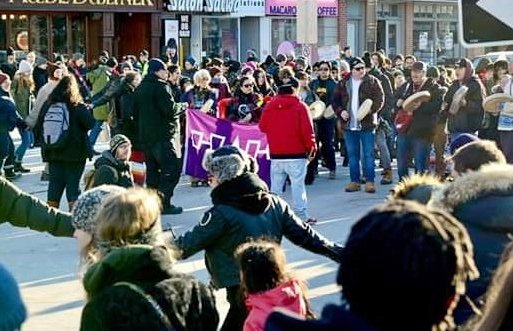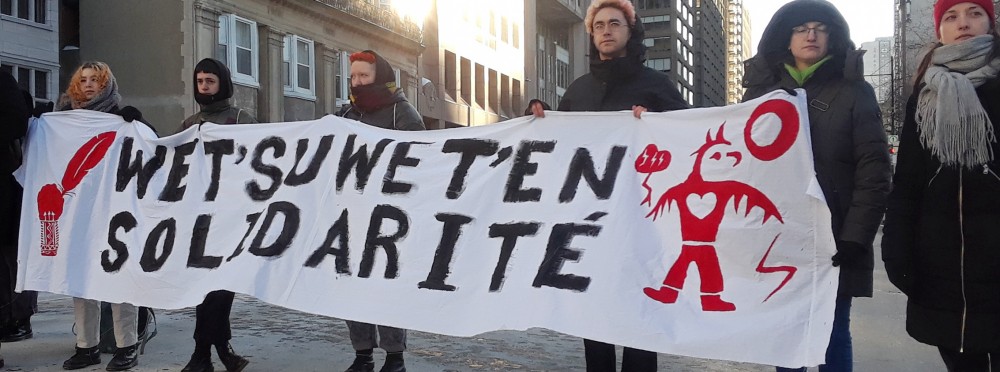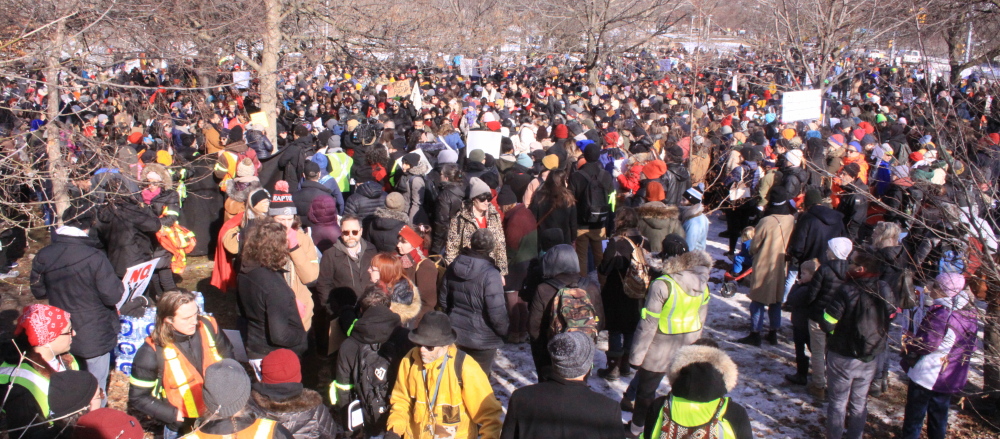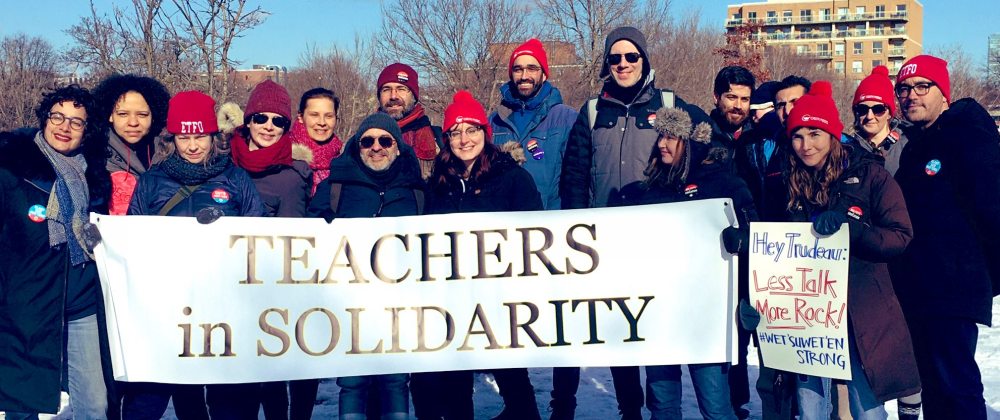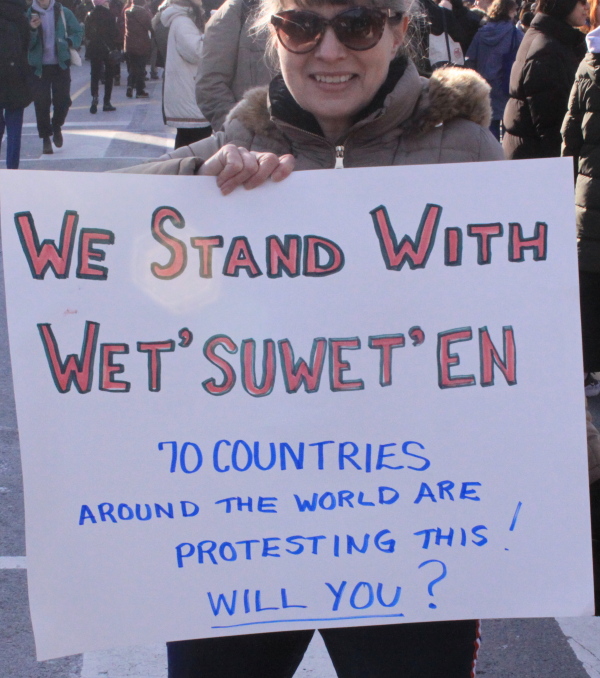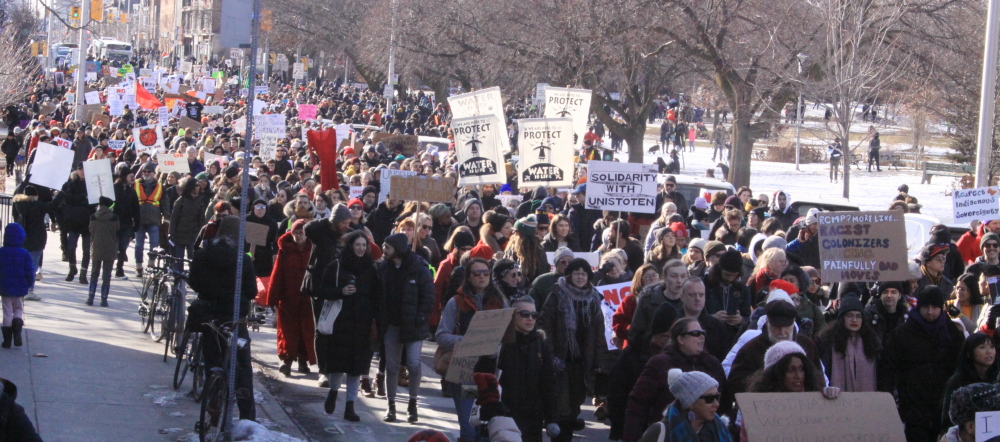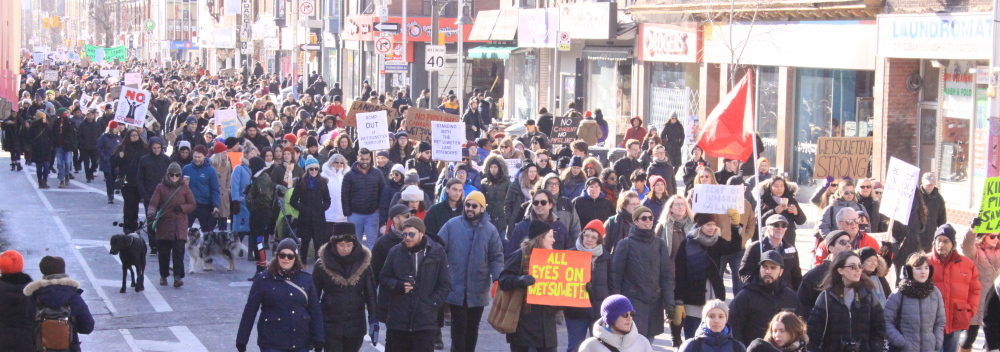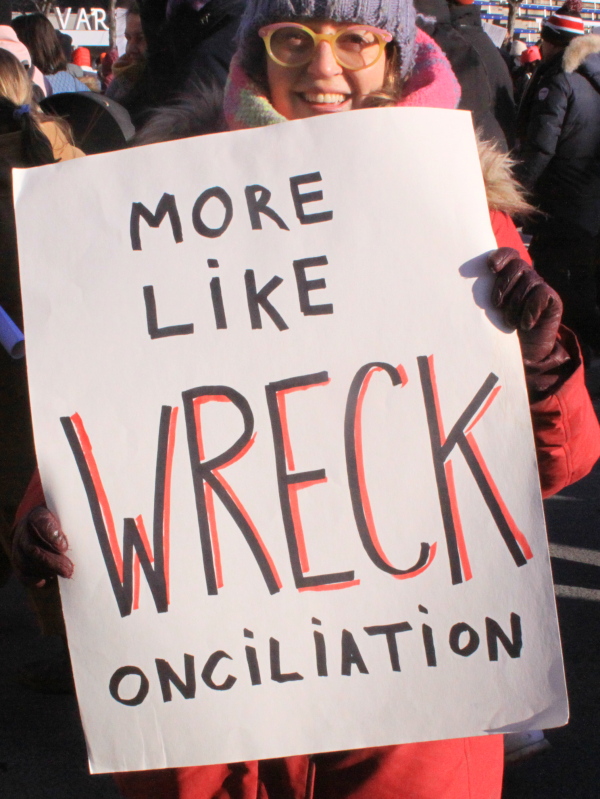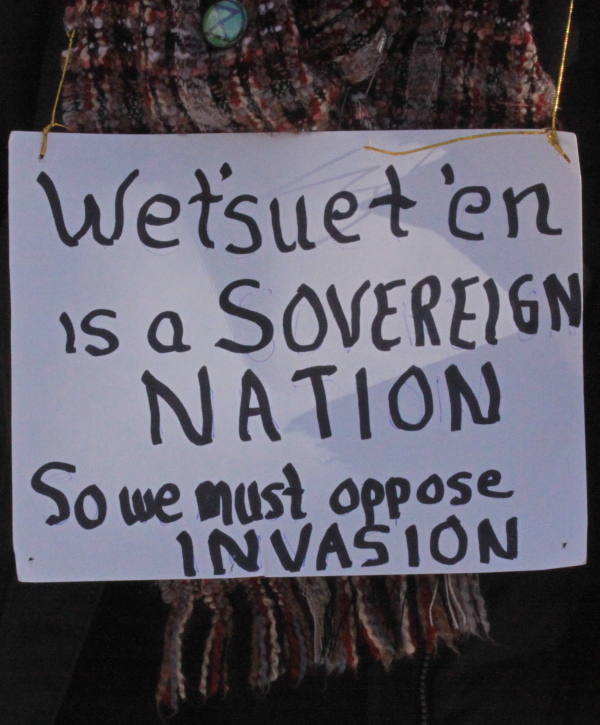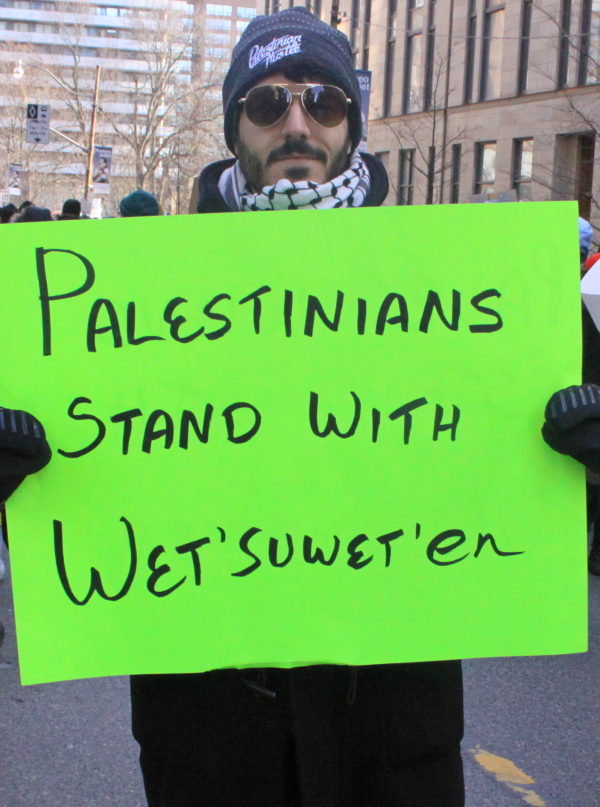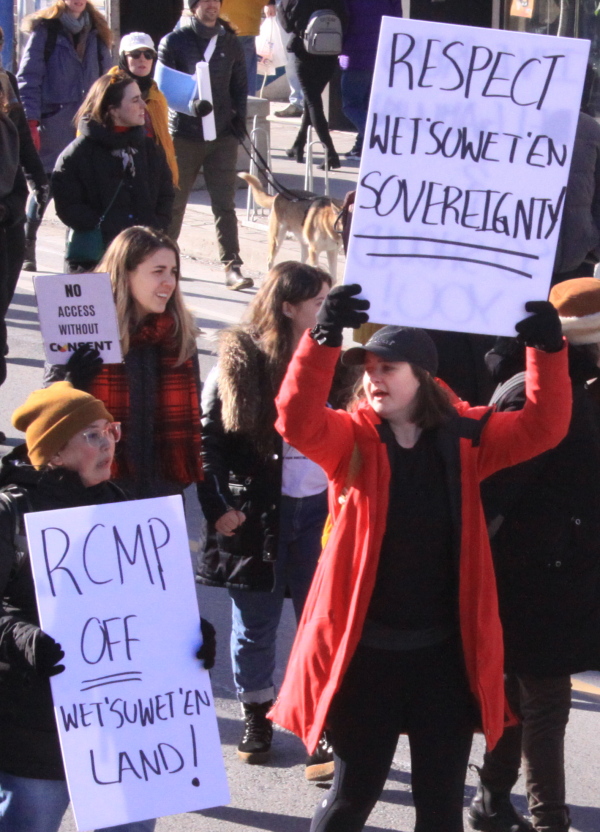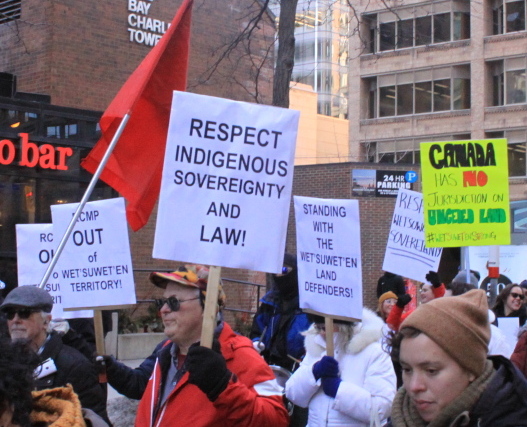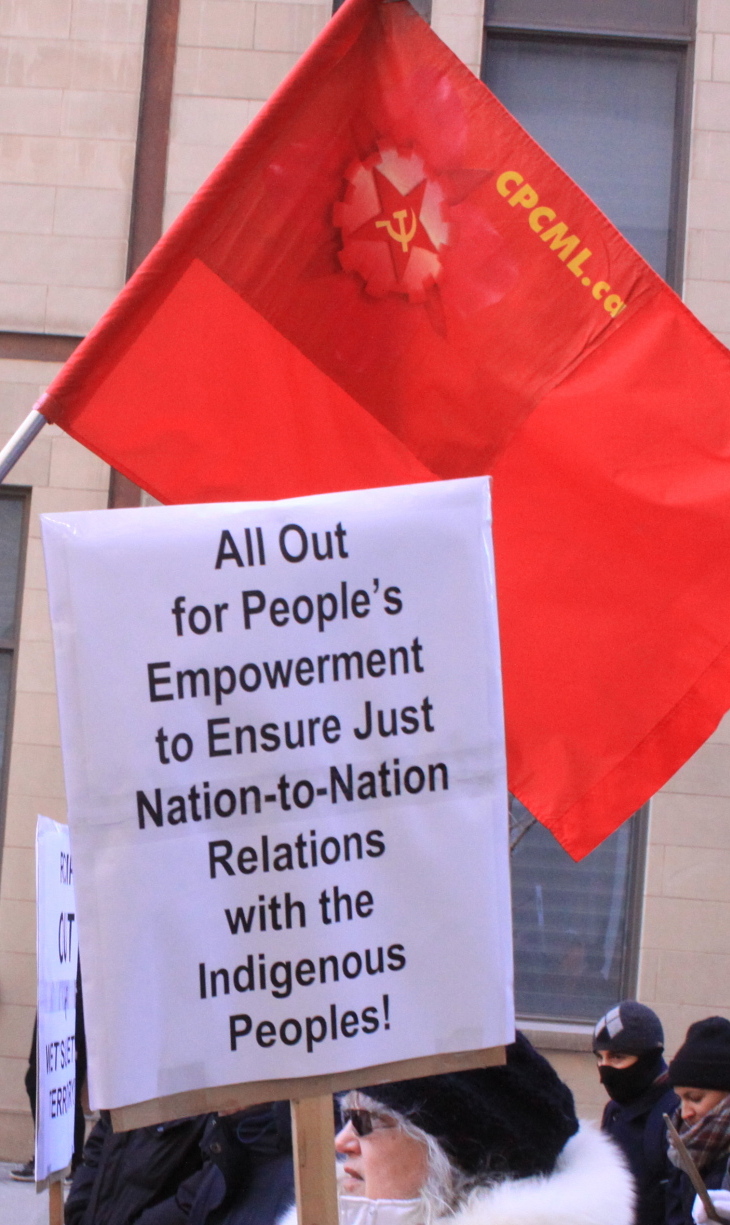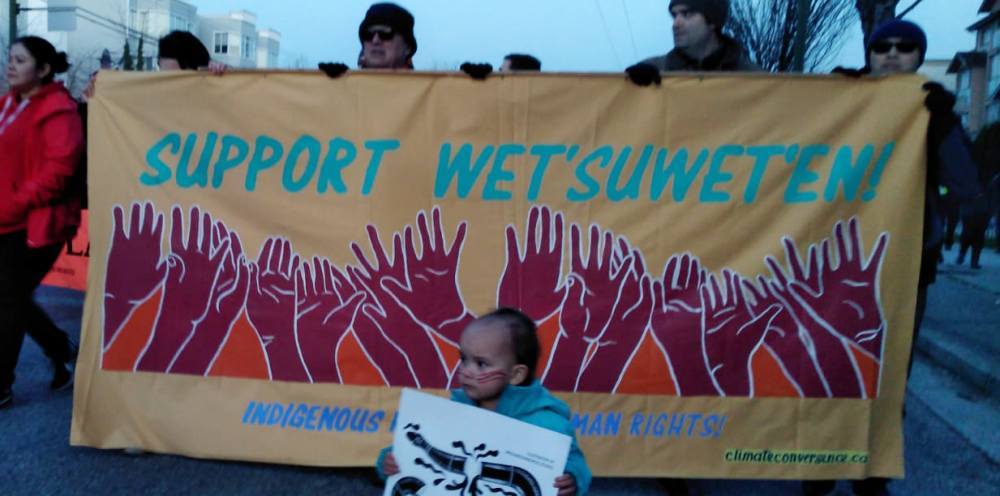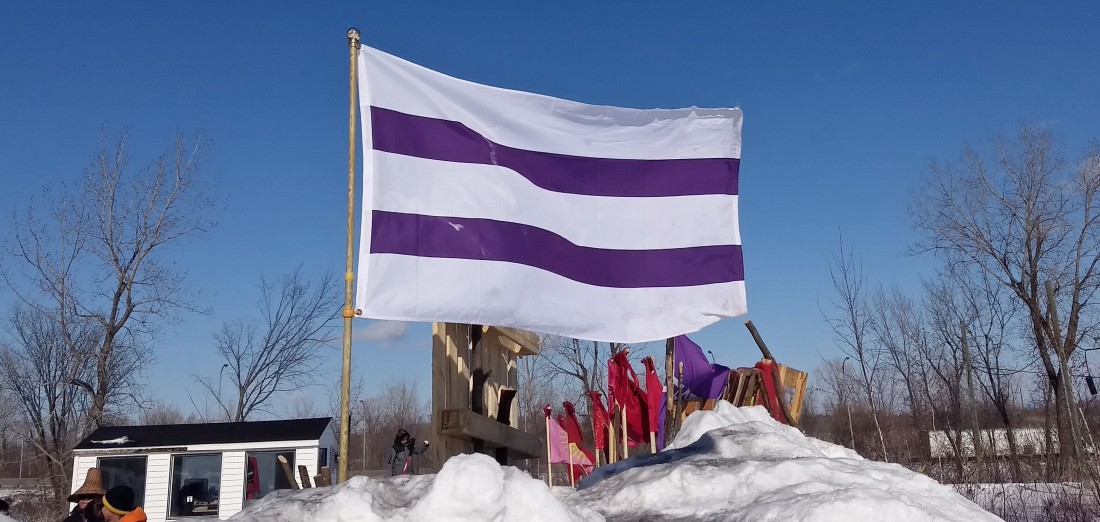
|
February 22, 2020 - No. 5
|
|
A New Relationship is
Required with Indigenous Peoples
The Onus Is on Canada, Not Indigenous Peoples
Since his election in 2015, Prime Minister Justin Trudeau has repeatedly said that "no relationship is more important to Canada than the relationship with Indigenous peoples," going so far as to tell the Assembly of First Nations meeting in December 2018 that a "new relationship" with Indigenous people was the legacy he wanted as prime minister.
Talk is cheap and Trudeau's words have been overtaken by the reality of not only the failure of the government to address the chronic problems facing Indigenous communities, including the crises of housing, lack of potable water, unemployment, poverty and youth suicides, but the repeated use of police violence against Indigenous people defending their rights. In case there was any confusion about where the government stands, the federal government is appealing through the courts the Canadian Human Rights Tribunal's decision that Canada has been underfunding on-reserve child welfare. Estimates are that over $9 million has been spent so far to appeal the orders of the Tribunal, including its order of September 2019 that the government pay each affected child $40,000.
 Talk of "reconciliation" and the "rule of law"
is now more than tiresome, with even cabinet ministers acknowledging
that words are being bandied about without action to back them up.
Worse, the government continues to carry out actions that show a
different face, with a deep-seated racism and contempt for Indigenous
peoples and for the rule of law. Both Prime Minister Trudeau and BC
Premier John Horgan have been called out repeatedly for their
disrespectful treatment of the hereditary chiefs, refusing to
meet with them since the current crisis began with the eviction notice
issued to Coastal GasLink on January 4.
Talk of "reconciliation" and the "rule of law"
is now more than tiresome, with even cabinet ministers acknowledging
that words are being bandied about without action to back them up.
Worse, the government continues to carry out actions that show a
different face, with a deep-seated racism and contempt for Indigenous
peoples and for the rule of law. Both Prime Minister Trudeau and BC
Premier John Horgan have been called out repeatedly for their
disrespectful treatment of the hereditary chiefs, refusing to
meet with them since the current crisis began with the eviction notice
issued to Coastal GasLink on January 4.
With their backs against the wall from the massive
and
country-wide actions in support of the just stand of the Wet'suwet'en
hereditary chiefs and Wet'suwet'en members living on their territory,
along with their supporters, the prime minister and premier have
reluctantly assigned cabinet ministers to offer to meet with the
Wet'suwet'en hereditary chiefs. For their part, the hereditary chiefs
continue to uphold the principled position that first the RCMP must
completely withdraw from Wets'uwet'en territories. The hideous face of
Canada's colonial institutions can be seen in Trudeau's feigned
patience with what he clearly portrays as "unruly chiefs" who refuse to
act sensibly. His position is based on a pretense that his
government has gone the distance, respected disobedience long enough,
encouraged dialogue long enough and now the "onus" to dismantle the
blockades belongs to the Indigenous leaders. He reiterated this
nonsense of where the "onus" belongs four times in his February 21
press conference. The message he sought to communicate came across loud
and clear: if they continue to refuse to dismantle the
blockades, they will get what they deserve.
None of these threats and duplicitous, hypocritical and
cynical
statements change the fact that the onus is on the government of Canada
to uphold the hereditary rights of the Indigenous peoples. The
government's failure to do its duty gives those who are upholding
hereditary rights just cause. Might does not make right, no matter how
many weezel words Trudeau throws at the
problem. Recognition
of Indigenous rights and title has become like a fish bone lodged in
the throat of the Liberal government that can't be swallowed and can't
be spat out. It will remain a choking point as long as there is no
break with the racist Indian
Act
and the colonial arrangements that were founded on dispossession of the
Indigenous peoples of their lands, which continue to this day and are
the foundation of the current crisis.
On January 4, the Wet'suwet'en, based on their own laws on their own unceded land, issued an eviction notice to Coastal GasLink. That law and the hereditary rights of the Wet'suwet'en cannot be extinguished by whatever Trudeau and Horgan and others mean when they self-righteously cite the "rule of law" and then rely on heavily armed colonial police to assault, arrest and remove people from their land.
Under the existing law, based on colonial arrangements, the Canadian state is derelict in its fiduciary duty to Indigenous peoples, both those whose nations have treaties and those that have not. To discharge that duty the Canadian state should, as a first step in building a new relationship, ensure a Canadian standard of living, including guaranteed income, education, health care, housing and infrastructure that meets the needs of the community, wherever it is. Canada has the means to do so. A government serious about new relationships, especially one that can spend billions on the Trans Mountain Pipeline, has the wherewithal to do so and has no excuse for maintaining the fiction that Indigenous people are 'welfare cases,' lazy, privileged or otherwise unworthy. Federal and provincial government leaders have to stop speaking and acting as if they have nothing to do with righting the historical wrongs or that Canadian society should not and does not have the means to do so.
The Onus Is on Canada, Not the Indigenous Peoples!
Impotent Response of the Office of the Civilian
Review and Complaints Division of the RCMP
A press conference in Vancouver on February 20 by the BC Civil Liberties Association, the Union of BC Indian Chiefs and the Wet'suwet'en hereditary chiefs released and discussed the response from Michelaine Lahaie, Chairperson of the Office of the Civilian Review and Complaints Commission (CRCC) for the RCMP to their written request for an investigation into what the organizations believe are unlawful RCMP actions on Wet'suwet'en Territory.
The press conference was addressed by seven people representing the organizations that have raised the issue: Harsha Walia, Executive Director of the BC Civil Liberties Association; Grand Chief Stewart Phillip, President of the Union of BC Indian Chiefs; Molly Wickham Sleydo', Wet'suwet'en Gidimt'en Clan Spokesperson; Delee Alexis Nikal, Wet'suwet'en Gidemt'en Clan, one of the complainants to the CRCC; Mary Ellen Turpel-Lafond Akikwe, Director of the University of British Columbia's (UBC) Indian Residential School History and Dialogue Centre and Professor at UBC's Allard School of Law; David Suzuki, Cofounder of the David Suzuki Foundation; and Ta'Kaiya Blaney of Indigenous Youth for Wet'suwet'en.
CRCC Chairperson Lahaie's nine-page letter was summarized by Harsha Walia. She reported that the chairperson has decided not to initiate a public interest investigation at this time, because similar concerns have already been raised with the RCMP about a 2013 case that is similar to what is happening on the Wet'suwet'en territory. Walia reported that the Chairperson provided a summary of the findings and recommendations on a range of issues regarding enforcement of injunctions, use of arrest powers, the role of RCMP in policing Indigenous land defenders, access restrictions, exclusion zones and stop checks that are contained in an interim, not yet public, report regarding the RCMP's response to anti-shale gas land defenders in Kent County, New Brunswick in 2013. This interim report, which includes 37 findings, has not been made public by the CRCC and is waiting for a response from the RCMP Commissioner, who has had the report since March 2019.
Among the CRCC's findings in the New Brunswick case are that there was no legal authority to require passengers to produce identification at stop checks, that the RCMP has no legal authority to conduct stop checks for the purposes of information gathering, that the concern for public safety that is stated is related to unconfirmed information that is not sufficient to justify an RCMP roadblock, that routine searches of vehicles and individuals conducted by RCMP were not authorized by law, and that a "buffer zone" or "exclusion zones" are only justifiable in specific limited circumstances and with the least interference to individual liberties. The CRCC found that certain arrests were made based on misinterpretations of the conditions of the injunction and that RCMP officers must have detailed and accurate interpretations of injunctions.
Walia, in concluding her remarks raised the concern that "what is incredibly disturbing about this letter from the Chairperson is that again the RCMP has been aware of these very same issues since March 2019." The events in New Brunswick happened in 2013, so for seven years the people in New Brunswick who filed the complaints have had no response and still do not have access to the report because it is not yet public. The letter can be found here.
The entire press conference can be seen here.
The speakers addressed the issues involved in relations between police and First Nations, historically and today in the case of the Wet'suwet'en, and called upon the federal and provincial leaders to end the police occupation and negotiate with the Wet'suwet'en hereditary leaders.
Grand Chief Stewart Phillip paid tribute to the
Wet'suwet'en hereditary chiefs and matriarchs and to the Indigenous
youth across Turtle Island for standing in solidarity with the
Wet'suwet'en who have "forcefully spoken out against the paramilitary
tactics of the RCMP, the occupation forces that are taking place in
Wet'suwet'en territory, and the shameful and disgusting fact that the
RCMP actions are very mercenary in nature, acting on behalf of Coastal
GasLink as opposed to protecting the broad interests of all parties
involved in these very very volatile issues."
He said, "We are at a crossroads in this country in regard to what this all represents and we need to move out of the colonial, neo-colonial shadow of the notion of exploiting the land and commodifying the land as opposed to caretaking and stewardship of this beautiful place that we describe as Canada and British Columbia. We need to understand that the UN Declaration [on the Rights of Indigenous Peoples] is of utmost importance for what it represents, to bring forward Indigenous law and Indigenous legal institutions to stand alongside the other systems of law that exist in this country. It is not a case of colonial law superseding Indigenous law or Indigenous institutions. Indigenous law is enshrined in our Indigenous languages, enshrined in our culture and traditions. It's taught to our children at the very youngest age and that is our responsibilities to Mother Earth, to the land and the waters, and Indigenous people are simply carrying out our own laws and our own traditions as we are taught by our knowledge keepers. And to have those activities criminalized by governments and by the RCMP and suffer the brutal repression that we have witnessed time and time again in this country is absolutely unacceptable." Phillip concluded, "We call on the governments, and I agree with Jody Wilson-Raybould where she suggested that Prime Minister Trudeau hop on a plane, pick up Premier Horgan and go to Smithers and meet with the hereditary leaders. This is going to be very protracted volatile intense days ahead."
In their remarks and in response to questions from the press, speakers stressed two things. One is the necessity to put an end to the unlawful activities of the RCMP. The second is the removal of RCMP and Coastal GasLink from Wet'suwet'en territory as the necessary condition for Prime Minister Trudeau and Premier Horgan to respectfully meet with their counterparts, the Wet'suwet'en hereditary leaders, in order to arrive at a peaceful resolution of the conflict based on respecting Indigenous rights.
(Photo: UBCIC)
Photo Review
Actions Continue Across the Country Demanding Rights and Title of Wet'suwet'en Be Respected
During the past week, along with the continuing blockades of transportation infrastructure in locations across the country, rallies and marches took place in a number of cities and towns. These included large marches in Vancouver and at the Rainbow Bridge in Niagara Falls. Film showings, concerts and other fundraisers and events were also organized to support the Wet'suwet'en land defenders.
In Ottawa and Toronto marches were organized on Ontario's Family Day holiday. Thousand poured into the streets of Toronto for the Family Day march to voice their demands that the Canadian government and Coastal GasLink must get off Wet'suwet'en lands and that new relations must be established with the Indigenous peoples that respect their jurisdiction and rights. For two hours the march made it way through the streets of the downtown, closing several major intersections along the way, before ending at Queen's Park.


Vancouver, BC
Powell River, BC


Chase, BC
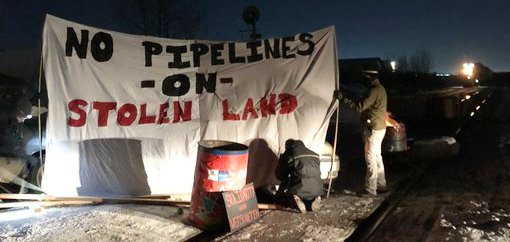
Edmonton, AB
Winnipeg, MB

Niagara Falls, ON
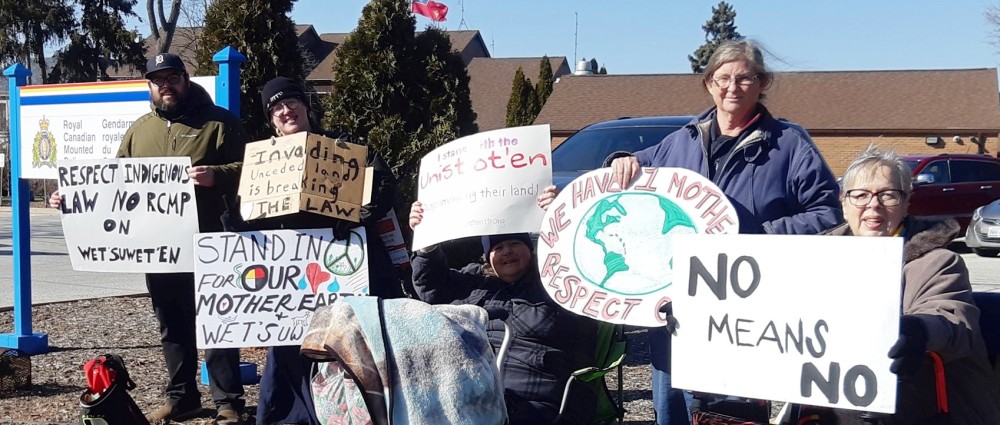
Windsor, ON
Thousand Islands Bridge, ON
Ottawa, ON
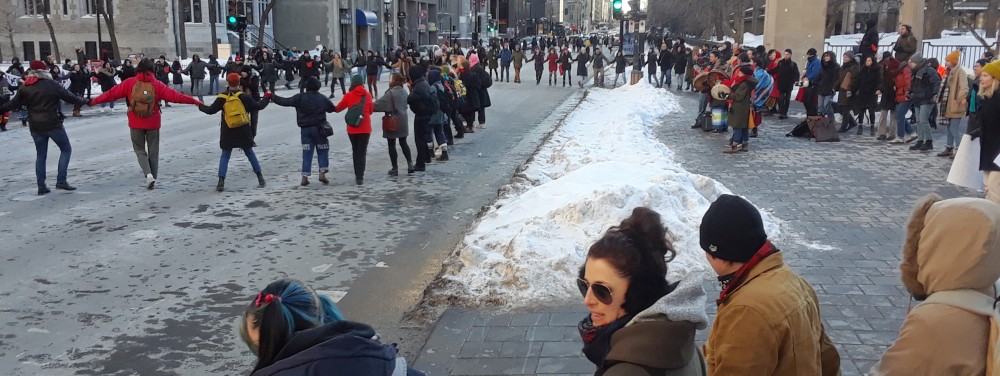
Montreal, QC
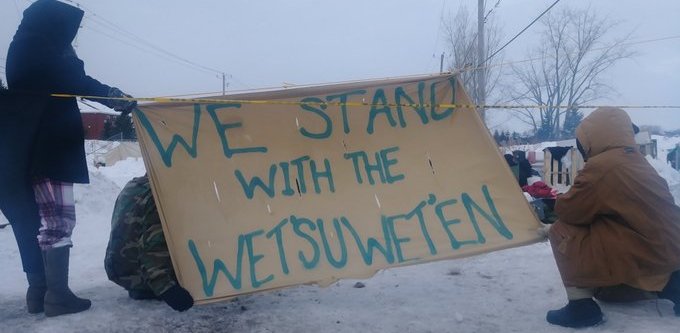
St. Lambert, QC
Family Day March in Toronto
(Photos: TMLW, EFTO, Climate 604, N. Knight, A Dub Lion, Dylana, Calgary for Wet'suwet'en, R. Brunell, Daanis, S. Rotz, Montreal Wet'suwet'en Solidarity, C. Farrugia )
Widescale Support of Unions and
Other Organizations for Wet'suwet'en Demands
TML Weekly is posting below excerpts from letters and media releases of various unions and organizations across Canada who are publicly taking stands in support of the struggle of the Wet'suwet'en people.
Canadian Union of Postal Workers
(CUPW)
Canadian Union of Public Employees (CUPE)
[...] "Canadians were shocked to see the aggressive action of heavily armed police at the Unist'ot'en camp as they removed peaceful protestors and blocked access to journalists," says Mark Hancock, National President of CUPE. "We would never accept this kind of behaviour towards striking workers on a picket line. Protest is a fundamental right, and the Wet'suwet'en people have a right to protect their unceded territory."
The five clans of the Wet'suwet'en have never signed a treaty with Canada and have never ceded their territory in central British Columbia. For almost a decade, the Wet'suwet'en hereditary chiefs have maintained several checkpoints and camps to halt any development in their territories from proceeding without their consent. Last week, heavily armed police began dismantling these checkpoints, and forcefully removed peaceful land defenders.
"If the Prime Minister and his government are truly committed to reconciliation, to the UN Declaration [on the Rights of Indigenous Peoples (UNDRIP)], and to building a better relationship with Indigenous peoples, the time and place to prove it is right here and right now," says Charles Fleury, National Secretary Treasurer of CUPE.
National Farmers Union
The National Farmers Union (NFU) stands in solidarity with Indigenous land protectors. We support initiatives by Indigenous People including the Unist'ot'en and Wet'suwet'en to resist resource extraction and energy projects that disrupt their Indigenous food and governance systems and interfere with the health of their lands, territories, and communities.
The NFU supports the implementation of the United Nations Declaration on the Rights of Indigenous Peoples and urges the Canadian government to implement the Truth and Reconciliation Commission's 94 Calls to Action.
Coastal GasLink is attempting to force construction of a liquid natural gas pipeline through unceded Wet'suwet'en territory. On February 6, 2020 the RCMP entered the territory and began arresting members of the Wet'suwet'en, forcibly removing land defenders, dismantling the barricades set up to protect their territory, and denying journalists access to witness and record the RCMP's activities.
These actions, carried out with support of the BC and federal governments, are clearly in violation of Canada's commitments to reconciliation, against the United Nations Declaration on the Rights of Indigenous People (UNDRIP) which Canada formally adopted in 2016, and in contravention of the Supreme Court of Canada's 1997 Delgamuukw Gisday'wa decision recognizing that the Wet'suwet'en people, as represented by their hereditary leaders, had not given up rights and title to their 22,000 square kilometre territory. We agree with and support the Wet'suwet'en hereditary chiefs' governance systems and their inherent right to govern their territory through the Unist'ot'en camp and the Gidimt'en checkpoint [...]
The decisions directing the RCMP to enter Wet'suwet'en territory and remove its defenders using force, and denying journalists access to witness their actions are condemned by Canadians from coast to coast to coast. In accordance with UNDRIP and our ongoing commitment to act in solidarity with Indigenous Peoples, we must inform ourselves and deepen our understanding of Indigenous sovereignty. We therefore denounce the repression of peaceful protesters, including Indigenous land protectors, and express our support for the rights of people to engage in acts of civil disobedience in defence of the preservation of water, air, land and wildlife for future generations.
National Union of Public and General Employees
The National Union of Public and General Employees (NUPGE) stands in solidarity with the Wet'suwet'en land defenders and continues to call for a peaceful resolution to the conflict [...]
The labour movement is no stranger to seeing governments invoke the law to suppress rights, and so we stand in solidarity with the Wet'suwet'en land defenders in their struggle [...]
As a family of unions committed to the full implementation of the Calls to Action of the Truth and Reconciliation Commission, as well as, the Calls for Justice of the National Inquiry into Missing and Murdered Indigenous Women and Girls, NUPGE is deeply troubled by the current and ongoing events on Wet'suwet'en territory, including the use of exclusion zones, forceful removal of land defenders, and threats to journalists [...]
The situation is especially shocking considering BC became the first jurisdiction in Canada to pass legislation implementing the United Nations Declaration on the Rights of Indigenous Peoples in November 2019.
Now is a critical moment. How governments, police, and people across Canada respond to this situation will not only test whether their commitment to reconciliation is genuine, but it will impact Indigenous and non Indigenous communities and our environment for generations to come.
Further escalations threaten to unravel progress towards reconciliation. We urge the RCMP to withdraw and ask for all parties to resume talks to reach a negotiated settlement.
Public Service Alliance of Canada (PSAC)
Last week, RCMP officers arrested and detained several Wet'suwet'en people on their unceded territory while they were defending their land from a major pipeline development. The Unist'ot'en community has had a camp set up since 2009 to block TransCanada Corp from building the Coastal GasLink pipeline [...]
PSAC's National Indigenous Peoples' Circle Representatives have been working to protect and defend the rights of Indigenous Peoples in Canada and abroad for a number of years. We condemn the injunction and arrest of those at Unist'ot'en Camp. We call on the provincial and federal governments to respect a nation-to-nation relationship with hereditary leadership at Unist'ot'en [...]
We ask those in the labour movement to stand in solidarity with the defenders at Unist'ot'en Camp with the goal of defeating this injunction and re-establishing the occupation of the Unist'ot'en's healing camp.
United Steelworkers
From letter to Prime Minister Trudeau: [...] Our union's members include thousands of Canadians who work in the rail sector, including members of Indigenous ancestry, who work hard every day to support their families, who support Indigenous rights and who now face uncertainty and potential job losses. We also have thousands of members whose jobs depend on commodity supply chains that rely on the Canadian railway transportation network [...]
In our view, the root cause of this current crisis is that successive governments in Canada have repeatedly ignored their responsibilities on reconciliation with Indigenous nations and peoples. For years federal governments have paid lip service to dialogue and reconciliation, but have failed to take the profound and meaningful action that is required to achieve true reconciliation [...]
This abject failure is reflected in the current protests and rail blockades across Canada and as a result, we are writing to ask you to take personal responsibility for this file and meet with all stakeholders to defuse the tensions in this conflict, find a resolution and demonstrate a genuine commitment to reconciliation. The Canadian economy, and the livelihoods of many of our members, depends on the Canadian railway system and we urge you to intervene in this dispute.
International Alliance of
Theatrical Stage Employees (IATSE)
British Columbia Federation of
Labour
Ontario Federation of Labour
The Ontario Federation of Labour (OFL) affirms its solidarity with the Wet'suwet'en nation, as they steadfastly defend their territories, and with those who are actively supporting Indigenous sovereignty through protests and blockades across Ontario and Canada.
The recent arrests of land defenders is yet another shameful example of Canada's failure to implement the Truth and Reconciliation Commission's Calls to Action and the United Nations Declaration on the Rights of Indigenous People. The Wet'suwet'en nation has the inherent right to self determination, which includes the right to defend their lands. The OFL encourages the RCMP, Coastal Gaslink, and all levels of government to engage in true reconciliation -- not just through words, but in meaningful actions that reflect and create a strong nation-to-nation relationship [...]
Government actions that continue to perpetuate Canada's ongoing legacy of colonialism and cultural genocide must stop.
Nova Scotia Federation of Labour
Members of the RCMP arrested seven individuals outside the Unist'ot'en healing centre Monday [February 10] during the fifth day of enforcing a court ordered injunction against members of the Wet'suwe'ten and their supporters blocking access to work sites for the Coastal GasLink pipeline.
Arresting land defenders, [and] their supporters and raiding their camps is not the answer when people work to defend their rights in Canada. People have the right to peaceful protest [...]
The Wet'suwet'en have never ceded their land. And under Wet'suwet'en law, hereditary chiefs of five clans have authority over the nation's 22,000 square kilometres of unceded territory. The hereditary chiefs have repeatedly opposed Coastal GasLink.
The labour movement is no stranger to seeing governments invoke laws to suppress workers' rights. The Wet'suwet'en hereditary chiefs issued an eviction notice to Coastal GasLink for violating Wet'suwet'en trespassing laws, but it seems they are not entitled to the same rights as corporations.
The Wet'suwet'en people have inherent Indigenous rights and title that must be recognized and respected. Therefore, we stand in solidarity with the Wet'suwet'en land defenders in their struggle and support that all parties find a peaceful resolution to the conflict.
BC Teachers' Federation
The BC Teachers' Federation reaffirms our solidarity with the Wet'suwet'en nation. As a union committed to the Truth and Reconciliation's Calls to Action and the United Nations Declaration on the Rights of Indigenous Peoples, we call on the governments of BC and Canada, the Royal Canadian Mounted Police and Coastal GasLink Pipeline to respect the position taken by the Wet'suwet'en hereditary chiefs. They are insisting upon respect for Indigenous sovereignty as they have never ceded their jurisdiction to the lands they have governed and have been stewards of for millennia. All five clans of the Wet'suwet'en nation have unanimously opposed all pipeline proposals. Forcibly removing peaceful land defenders from their traditional unceded lands is in violation of the UN Declaration [...]
Our provincial government recently passed a bill that states they will honour the UN Declaration on the Rights of Indigenous Peoples. Actions speak louder than empty promises that First Peoples have faced for decades. If the leaders of our province and country are truly committed to reconciliation and honouring the UN Declaration on the Rights of Indigenous Peoples, then immediate action is required. Elected leaders must act now by negotiating with the respected leaders of the Wet'suwet'en nation who hold the inherent right to self-determination, including the right to defend their lands [...]
The 45,000 members of the BC Teachers' Federation stand in solidarity with the Wet'suwet'en peoples and demand that the government of BC and Canada uphold their responsibilities laid out in the Supreme Court Delgamuukw Gisday'wa decision of 1997. We stand as witnesses at this historic moment when our governments must make a choice to uphold this court decision or continue the ongoing legacy of colonization.
Ontario Secondary School Teachers’ Federation (OSSTF)
[...] We disagree with government actions that
would
limit the ability of citizens to exercise their right to free and
peaceful assembly. We call on the federal and provincial governments to
respect and uphold the United Nations Declaration on the Rights of
Indigenous Peoples (UNDRIP) and recognize and respect Indigenous
peoples’ right to self-determination. Furthermore, the
federal
and provincial governments should respect the Supreme Court of
Canada’s 1997 ruling, Delgamuukw vs. British Columbia, which
found Aboriginal title could not be extinguished and established that
Wet'suwet'en never relinquished title to their territories.
Therefore, the 60,000 members of OSSTF/FEESO stand in solidarity with
the Wet’suwet’en peoples. OSSTF/FEESO calls on all
parties
to respect the position taken by the Wet’suwet’en
Hereditary Chiefs, respect Indigenous sovereignty, and acknowledge and
that they have never ceded their jurisdiction to the lands they have
governed and have been stewards of for generations. Forcibly removing
peaceful land defenders from their traditional unceded lands is a
violation of the UN Declaration.
BC Government and Service Employees' Union (BCGEU)
The BCGEU has been closely monitoring the developing situation at the Unist'ot'en camp. As a trade union committed to supporting the full implementation of the calls to action of the Truth and Reconciliation Commission and the recommendations of the United Nations Declaration on the Rights of Indigenous Peoples, we are concerned that police action has been used to suppress the rights of both peaceful protesters and the media.
We urge the RCMP, Coastal Gaslink and the provincial government to work with the Wet'suwet'en hereditary leadership and the elected council to resolve the current dispute in the spirit of the principles articulated in those documents.
The Wet'suwet'en people have inherent Indigenous rights and title that must be recognized and respected. What happens at the Unist'ot'en camp could have lasting repercussions for generations of Indigenous and non-Indigenous British Columbians.
Emily Carr University Faculty Association (Vancouver)
[...] The United Nations Committee on the Elimination of Racial Discrimination recently called for Canada to immediately halt the Coastal GasLink pipeline, the Site C Dam, and the Trans Mountain Pipeline because these projects have not received the Free, Prior and Informed Consent of the Indigenous peoples whose lands they would pollute and destroy. Morally and environmentally in this time of accelerating climate destabilization, we cannot afford these projects. As such, we ask that colonial governments and their police forces de-escalate and abide by Wet'suwet'en law by respecting the decisions that have been made by the hereditary chiefs whose Indigenous rights must not be violated through police brutality or colonial force.
Ontario College of Arts and Design (OCAD)
University Faculty Association
The OCAD University Faculty Association stands in solidarity with Wet'suwet'en hereditary chiefs and activists at the Unist'ot'en Camp defending their territory and the environment [...]
We denounce the militarized actions by the RCMP to use violence and forcibly remove peaceful land defenders from Wet'suwet'en territory. This is unceded land and has been recognized as such by a 1997 Supreme Court decision that affirmed Wet'suwet'en rights to their land. International law and the Royal Proclamation of 1763 affirm the fact that Canada has no legal jurisdiction on unceded territories. The hereditary clan chiefs, leaders under the traditional form of governance, are in opposition to the construction of the Coastal Gas Pipeline, that would carry fracked gas through unceded Wet'suwet'en land.
In the past few days Canadians have witnessed the RCMP use tactics not dissimilar to those used in a police state. An extra-judicial 'exclusion zone' was declared within which media were denied press freedoms to document police actions. The images that have come through the frontlines are disturbing. Unarmed matriarchs violently arrested, some in the midst of carrying out ceremony. RCMP using attack dogs and storm trooper artillery to wrestle Indigenous land defenders to the ground. This is not what reconciliation looks like.
We call upon the federal and provincial government and the RCMP to honour the United Nations Declaration on the Rights of Indigenous Peoples [...] an international document that gives Indigenous people the right to control resource projects on their land. Free and prior consent is needed. Under Wet'suwet'en law all five clans have unanimously opposed all pipeline proposals. The forcible removal and construction of the Coastal Gas Pipeline is a violation of international, Canadian and Wet'suwet'en law.
Prime Minister Justin Trudeau was recently elected on a promise to build new relations with Indigenous First Nations. Reconciliation does not take place under the barrel of a gun. BC Premier John Horgan has said he believes 'positive reconciliation initiative' is possible -- the actions of the government and RCMP counter this sentiment.
We thank the Wet'suwet'en people who are standing up for all of us and have been honouring the land for millennia.
Greater Victoria Teachers'
Association (GVTA)
The GVTA supports those protesting peacefully to defend the Wet'suwet'en, and denounce police action against these protesters.
(Photo: Climate 604)
Proposal to Replace Blockaded Trains with Trucks Is an Attempt to Embroil Truckers in the Denial of Indigenous Rights: the Answer Is No!
Radio-Canada reports that talks related to the rail blockades organized in support of the Wet'suwet'en Nation, are underway between the Quebec Ministry of Transport (MTQ) and the Quebec Trucking Association (ACQ), which represents the majority of the province's major transportation companies. The MTQ is positing an immediate need to transport goods deemed essential and wants truckers to break the effectiveness of the blockades.
Radio-Canada says the talks are focused on logistics and the availability of trucks and drivers and quotes ACQ President Marc Cadieux as saying, "I had discussions with certain carriers and yes, I'm being told that there have been requests [...] There are costs associated with the reorganization of transportation logistics. It requires unusual moves."
The MTQ has raised concerns about the transportation of propane in a hysterical fashion and asked carriers if they have suitable trucks, equipment and enough drivers available for long hauls throughout Quebec, Ontario and even the United States.
The request from the MTQ to the ACQ has caused discussion amongst truckers who, like the Wet'suwet'en, demand a say in how life unfolds. The MTQ and the ACQ regard the thousands of truckers working in Quebec as a mere means of production available to the monopolies to do their bidding under all conditions and circumstances, who must jump to attention when summoned. Many truckers are saying, hold on a second; we have rights, as do all people. We have the right to conscience, to think and to decide for ourselves a course of action, and to speak out on the issues at hand and give our consent or not.
At no point does it occur to the government authorities and financial oligarchy that truckers may very well support the cause of the Wet'suwet'en and say No! to this request. Working people have common cause with the Indigenous peoples and a social responsibility to demand that the situation be resolved on the basis of the recognition of the rights and the sovereignty of the Wet'suwet'en people.
The MTQ and the ACQ have always collaborated in smashing the standards and regulations that benefit truckers. The ACQ, as a representative of large transportation companies, has consistently opposed the creation of an independent truckers' organization to represent workers' interests. Now the ruling circles want truckers to work to secure the transportation of goods held up by the blockades and in doing so undermine the cause of the Indigenous peoples for justice and new anti-colonial nation-to-nation relations. A growing number of truckers are opposed to capitulating to the ruling elite. They are speaking out in their workplaces and on social media. Many find despicable the government's request that the trucking industry rescue the financial oligarchy in its battle against the rights of the Wet'suwet'en.
Truckers have long been dissatisfied with their working conditions and have been waging their own struggle in defence of their rights, particularly since the deregulation of the industry began in 1990. Many truckers are even saying that they themselves should block the roads in support of the Wet'suwet'en and show their strength vis-à-vis the economy.
Many truckers
consider the demand of the MTQ and the ACQ insulting, an affront to
their dignity, cooked up behind their backs without their consent,
similar in some ways to forcing a pipeline through Wet'suwet'en
territory without their consent. The situation reinforces their resolve
to build their own organization to defend their interests as a
collective of truckers with the ability to speak out in their own name,
rather than having others speak on their behalf.
Truckers, amongst themselves and on social media, are saying No! to the demand of the ACQ and MTQ. They are sending a clear message, "No Consent," to Canada's Minister of Transport Marc Garneau, Quebec's Minister of Transport François Bonnardel, and to the President of the ACQ. Truckers are telling them that they are unwilling to offer their capacity to work to perpetuate the denial of the rights of the Wet'suwet'en and the use of state-organized colonial violence against Indigenous peoples and their supporters and against working people, such as is being used against workers at Federated Co-operatives Limited in Regina.
The refusal of the ruling elite to end the Canadian colonial order affects us all. Let us together seize this occasion to express our solidarity with all those who are fighting for their rights in Canada and thereby demonstrate in practice our determination to do the same for ourselves.
Quebec Government Announces "Grand Alliance"
with Cree While Calling for Police Intervention
to End Blockades
With much fanfare, while at the same time calling for a Canada-wide police intervention to dismantle the various railway blockades set up in support of the Wet'suwet'en, the Quebec government has announced a "Grand Alliance" with Cree Grand Chief Abel Bosum. The tentative agreement includes extending the building 700 km of new railway from Matagami (located about 200 km south of James Bay) to Whapmagoostui on the eastern shore of Hudson's Bay, where a deep-water port is to be built; the electrification of industrial projects, training of local manpower and mining projects for strategic minerals such as lithium. Premier François Legault stated that the "win-win" partnership will allow both nations -- the Cree nation and the Quebec nation -- to grow and that he hoped that the Grand Alliance will serve as a "model" for other Indigenous communities.
Ironically, this announcement comes when some members of the Cree community, such as Paul Dixon, from Waswanipi, North of Val-d'Or, and Director of the Cree Trappers Association, are speaking out about the disappearance of caribou and other animals. Dixon blames the clearcutting of black spruce and mining in that region and named one company in particular, Canadian Malartic. He stated that the James Bay hydroelectric project, the Phase I of which began in the 1970s, had a tremendous social and economic impact on the Cree Nation, and that generations of Cree trappers had never wanted their hunting to stop or to see their traps broken. He said that most of the families and members of the community are opposed to mining industries and that for him, the destruction of the natural environment of the Cree nation is a crime.
As for James Bay, the political elite conveniently forget that work on the "project of the century" was announced and actually began without even a mention of the Cree or Inuit it would directly affect and on whose ancestral lands the project was being built. The First Peoples had to defend themselves through the courts to force the political and economic elites of the time to admit that they had not consulted the people living on those lands.
As for Legault's calls to resolve the "railway crisis," he claims to be thinking of those who have lost or will lose their jobs and that, though it is important to listen to the Indigenous nations, "we must also listen to Quebeckers and Canadians who are suffering at this time." Truly shameless statements coming from a Premier whose callous indifference to the demands of the public sector workers and the open efforts by the Quebec government to further attack their already dire working conditions and the shameful situation in health and education in Quebec are clear indications that the suffering of the people is not their concern. If those political and economic elites truly want Prime Minister Trudeau to "solve the crisis," then they must insist that the RCMP and Coastal GasLink withdraw from Wet'suwet'en territories and that Wet'suwet'en rights, and national and international law be respected.
These efforts to divide the people on the basis of sophistry must not succeed. The lines are clearly drawn. Either we open the path to progress or we defend the colonialist status quo. We must stand with the Wet'suwet'en!
At the Kahnawà:ke Blockade
On February 21, representatives of the Workers' Centre of the Communist Party of Canada (Marxist-Leninist) went to Kahnawà:ke to support the Mohawk people who have set up a barricade on the Candiac railway line on Montreal's South Shore. The barricade has been in place since the RCMP entered Wet'suwet'en territory to dismantle their camp, through which the Wet'suwet'en refused access to their land to Coastal GasLink, which wants to run a pipeline through it. They offered food as gifts to those present, as well as the February 15 issue of TML Weekly, which deals extensively with the issue. A spirited political discussion ensued with the Mohawk community at the barricade. The Workers' Centre stated that the workers and people of Quebec and Canada stand firmly with the Indigenous peoples and also want an end to the Canadian colonial order; that they reject the fact that Prime Minister Justin Trudeau and Quebec Premier François Legault are speaking in their name; and that British institutions have been imposed on us all to ensure that decisions are made without the consent of the peoples and nations that make up Canada.
The representatives of the Workers' Centre also stated that above all else, these same institutions block all forms of fraternal relations between the people of Quebec and the Indigenous peoples. These words were very well received, especially in light of various forces calling themselves nationalists, which are demanding police intervention to end the barricades. The discussion, by contrast, emphasized the need for and importance of new human relations that will create a situation whereby the recognition and affirmation of the rights of all become the essential element in solving the problems we face and will result in the renewal of the constitutional arrangements.
(To access articles individually click on the black headline.)
Website: www.cpcml.ca Email: editor@cpcml.ca

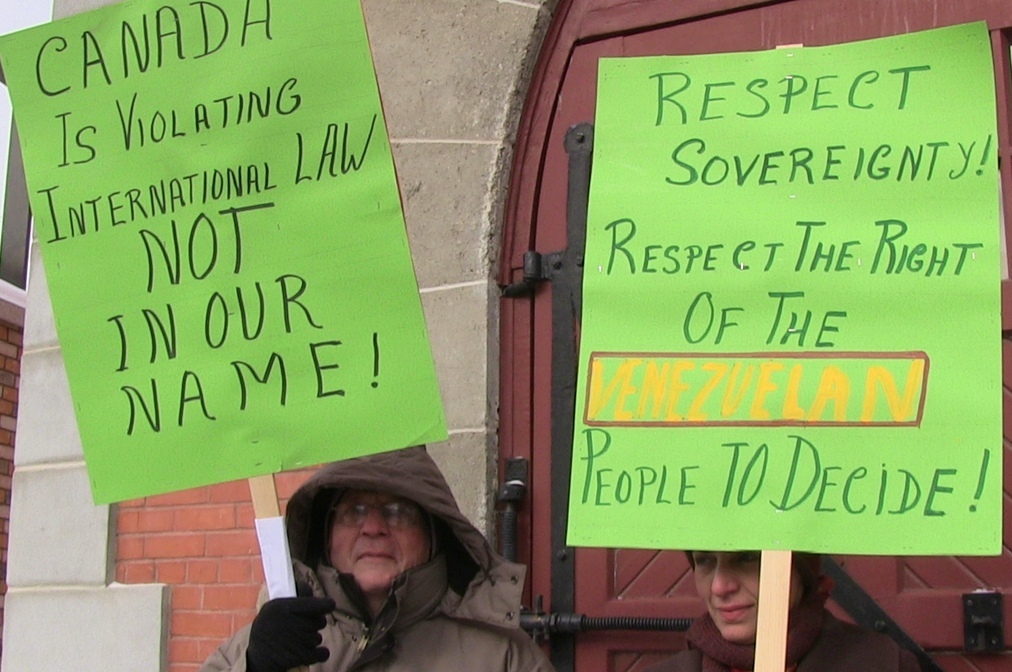

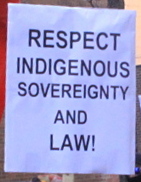
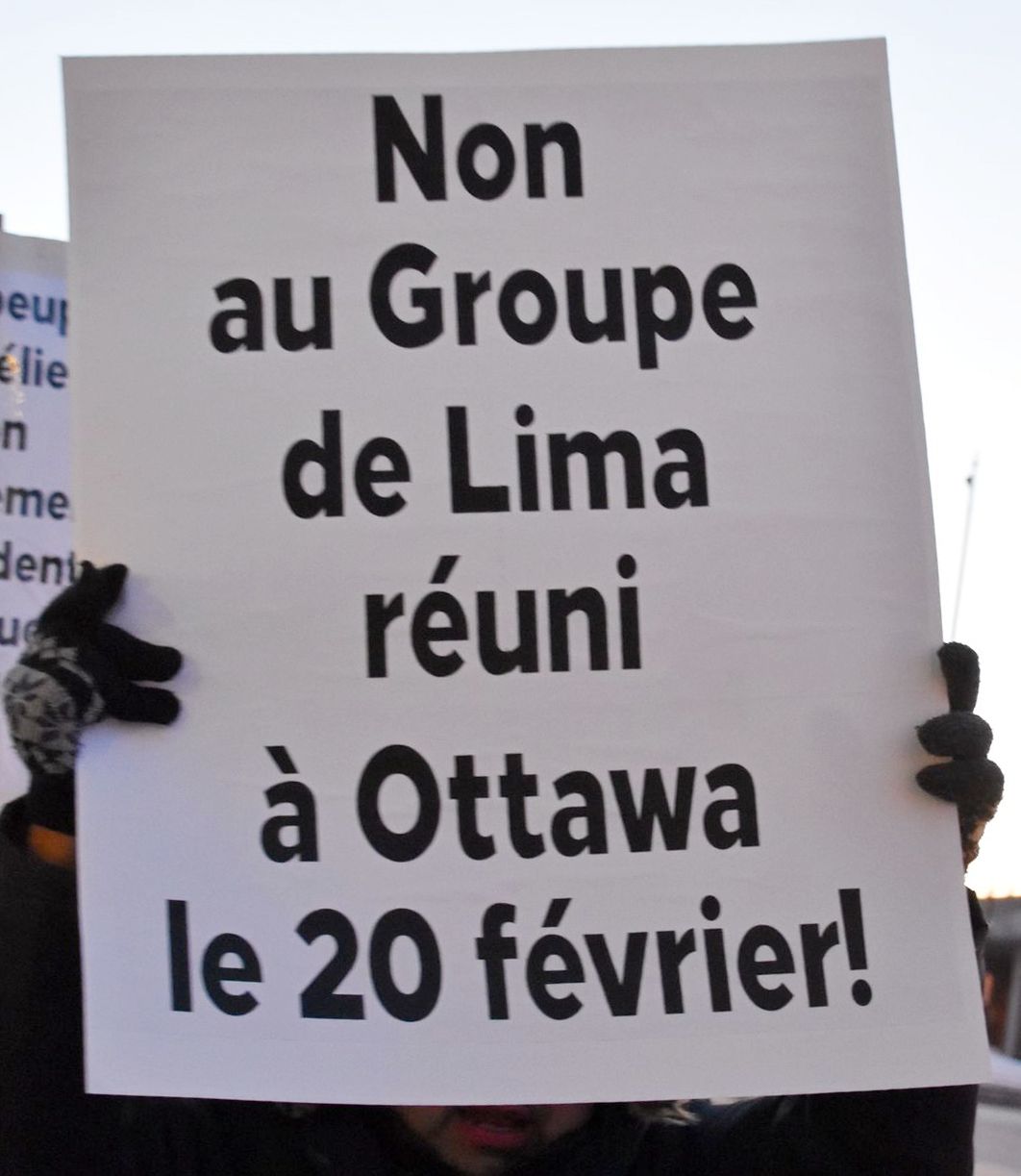 This
week Canada's lack of regard for the UN Charter and tenets of
international law and diplomacy in the conduct of its foreign affairs
was on full display as it hosted the illegitimate Lima Group in
Gatineau to conspire against the Venezuelan people and continue
interfering in their affairs in an effort to bring about regime change.
It cynically refers to this as "restoring democracy." However this was
denounced with the contempt it deserved outside the meeting venue in
Gatineau, in Montreal outside Prime Minister Justin Trudeau’s
riding office, in Toronto at Deputy Prime Minister Chrystia
Freeland’s office and at offices of MPs and Ministers in
other
cities as well.
This
week Canada's lack of regard for the UN Charter and tenets of
international law and diplomacy in the conduct of its foreign affairs
was on full display as it hosted the illegitimate Lima Group in
Gatineau to conspire against the Venezuelan people and continue
interfering in their affairs in an effort to bring about regime change.
It cynically refers to this as "restoring democracy." However this was
denounced with the contempt it deserved outside the meeting venue in
Gatineau, in Montreal outside Prime Minister Justin Trudeau’s
riding office, in Toronto at Deputy Prime Minister Chrystia
Freeland’s office and at offices of MPs and Ministers in
other
cities as well.
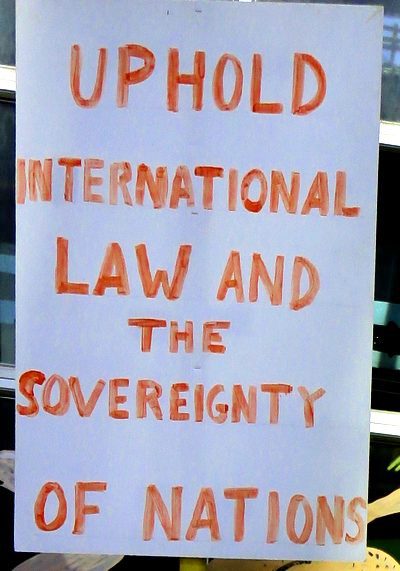 The Non-Aligned
Movement -- comprising some 120 of 193 UN member states, virtually all
from Asia, Africa, the Caribbean and Latin America -- last year
launched a campaign calling for strengthening multilateralism. Its
stand is in support of peace and diplomacy that is based on the
sovereign equality of all UN member states, mutual non-aggression, and
non-interference in one another's domestic affairs. Its aim is to make
the UN serve the purpose it was created to fulfil and to hold the U.S.
and those appeasing it to account so that they cannot continue applying
their "rules" by attacking the peoples of Venezuela, Cuba, Nicaragua,
Iran, Syria, Yemen, the Democratic People's Republic of Korea, and
others with impunity, and enforcing murderous sanctions against them,
which are acts of war. It is the antithesis of the multilateralism
Canada is practicing as it goes about appeasing U.S. imperialism,
violating in the name of high ideals the right of the peoples to live
in peace, without interference and free from the threat or use of force.
The Non-Aligned
Movement -- comprising some 120 of 193 UN member states, virtually all
from Asia, Africa, the Caribbean and Latin America -- last year
launched a campaign calling for strengthening multilateralism. Its
stand is in support of peace and diplomacy that is based on the
sovereign equality of all UN member states, mutual non-aggression, and
non-interference in one another's domestic affairs. Its aim is to make
the UN serve the purpose it was created to fulfil and to hold the U.S.
and those appeasing it to account so that they cannot continue applying
their "rules" by attacking the peoples of Venezuela, Cuba, Nicaragua,
Iran, Syria, Yemen, the Democratic People's Republic of Korea, and
others with impunity, and enforcing murderous sanctions against them,
which are acts of war. It is the antithesis of the multilateralism
Canada is practicing as it goes about appeasing U.S. imperialism,
violating in the name of high ideals the right of the peoples to live
in peace, without interference and free from the threat or use of force. In
an address to the Montreal Council on Foreign Relations on February 21,
Minister of Foreign Affairs Francois-Philippe Champagne outlined what
he said were the aims of Canada’s foreign policy, and declared
that the campaign for a seat on the Security Council was an opportunity
for Canada to give credibility to, strengthen and better adapt
multilateralism to the realities of today. In this regard he lamented
what he called an upsurge in the selective application and flouting of
international law, saying the rules-based international order was under
threat. As a result the multilateral system needs modernization, he
said, to adapt it to the new realities of today. Champagne said Canada
needed to take the lead on this internationally, giving examples of how
it has already contributed to the concocted "rules-based order" Canada
champions. He pointed to Canada's role in the creation of the Bretton
Woods Institutions (IMF, World Bank) and NATO, along with its
pioneering during an earlier stint on the Security Council of the
imperialist “responsibility to protect” concept. And
of course, more recently, the Lima Group. While Champagne was speaking
Canadians and Quebeckers demonstrated outside to denounce
Canada’s hosting of a meeting of the Lima Group, and its ongoing
interference in the affairs of the Venezuelan people.
In
an address to the Montreal Council on Foreign Relations on February 21,
Minister of Foreign Affairs Francois-Philippe Champagne outlined what
he said were the aims of Canada’s foreign policy, and declared
that the campaign for a seat on the Security Council was an opportunity
for Canada to give credibility to, strengthen and better adapt
multilateralism to the realities of today. In this regard he lamented
what he called an upsurge in the selective application and flouting of
international law, saying the rules-based international order was under
threat. As a result the multilateral system needs modernization, he
said, to adapt it to the new realities of today. Champagne said Canada
needed to take the lead on this internationally, giving examples of how
it has already contributed to the concocted "rules-based order" Canada
champions. He pointed to Canada's role in the creation of the Bretton
Woods Institutions (IMF, World Bank) and NATO, along with its
pioneering during an earlier stint on the Security Council of the
imperialist “responsibility to protect” concept. And
of course, more recently, the Lima Group. While Champagne was speaking
Canadians and Quebeckers demonstrated outside to denounce
Canada’s hosting of a meeting of the Lima Group, and its ongoing
interference in the affairs of the Venezuelan people. 
